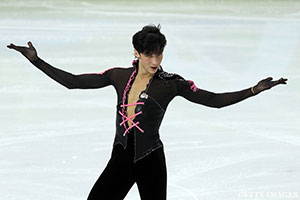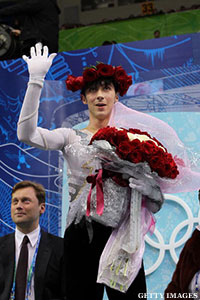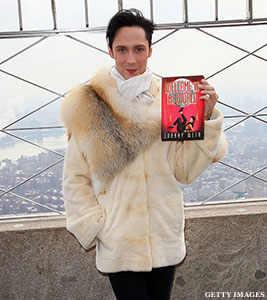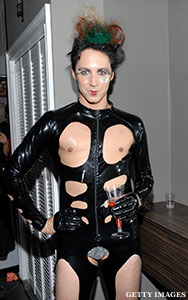It was one of the stranger moments of a strange week when I realized that if I had to compile a list of my favorite athletes, Johnny Weir would almost certainly be on it. Not just on it either, but in the top five at least.
Maybe higher.
While most athletes can be comfortably described in an oh-so-neat-and-tidy phrase -- think big-hitting center fielder, three-point king, multiple Cy Young award winner, and so on -- there is no shortcut in this case.
So who is Johnny Weir?

Let’s start with the easy bit. What is certain is that Weir is a figure-skater, or was, and soon will be again. He did not win the Winter Olympic men’s program in Vancouver a year ago, or even finish on the podium, yet he managed to leave the event with an army of fans and a profile higher than eventual champion and fellow American Evan Lysacek.
Weir’s flamboyant costumes, provocative routine and propensity to shoot from the lip guaranteed him a swathe of headlines that exceeded those you’d expect of most gold medalists, let alone a performer who ended up, as he did, in sixth place. As much as the public endearment warmed Weir, the judges’ harsh scoring wounded him, ate away at the competitor inside.
But the 26-year-old, originally from Quarryville, Pa., is also an entertainer, and was both before and after his temporary retirement from the rink. He is a now a performing artist too, with a single -- “Dirty Love” -- that has reached No.1 in Japan. He is a reality television star and a fashion designer. Personality-wise, he is extravagant, polarizing, shameless, and utterly unshackled by the boundaries of conventional behavior. And he is, in all probability, the most interesting interviewee that I have ever met.
In an age of athletes’ media training and carefully scripted answers, it is impossible to avoid the expectation as a journalist that you will be fed a bunch of half-truths. Not lies, not always anyway, but at the very least the kind of PR-drivel that uses a barrelful of words to deliver a shot glass sized measure of insight.
Sitting down with Johnny Weir then, is a culture shock, and an eminently pleasant one. Because with Weir, the niceties of prepared speech are refreshingly absent. Each answer is carefully thought out in that moment, designed to bring maximum depth and to portray what he really thinks in the most colorful way possible. If it shocks or stuns, that’s just too bad.
Our face-to-face meeting comes in a small employees’ office at a Los Angeles bookstore. As I enter the room, Weir is wearing a leopard-patterned cashmere sweater, a smattering of make-up, a carefully groomed mullet and a warm smile. We shake hands and he sets about answering the question.
Who is Johnny Weir?
Johnny Weir is … a weirdo.
Before Weir’s most ardent followers start carving out voodoo dolls that vaguely resemble my out-of-date and somewhat-thinner-than-reality byline photo, be aware that "weirdo" is his choice of phrase and not mine.
He doesn’t just sit comfortably with the term; he wears it as a badge of honor, and has no problem setting himself up as a representative of the section of society that does not fit nicely into a particular niche of mainstream conformity.
“I am here for all the freaks and weirdos and people who are misunderstood,” says Weir, with a mischievous smile and a flick of his hair. “All the people who are told they are strange or different. All the people who get picked on and told they are wrong because they do things a different way.
“If just one person, one child who is made to feel isolated, looks at me and sees that it is okay to be your own person and walk down your own path, then everything I have ever gone through will be worth it.
“I’m different and I have to be a warrior to be that way. But I have had some success, I hope I have touched the lives of some wonderful people, all by being what I see as myself, but some others people see as different.”

"Different" is no insult when it comes to Weir; it is just a fact. Other figure skaters don’t get harassed by animal rights activists for wearing fur-lined costumes, or become the target of stalkers who wait outside their apartments.
Weir’s contemporaries in the men’s field in Vancouver didn’t wear high heels or carry purses, and no other male member of the United States Olympic team roomed with a woman (Weir shared accommodation in the Athletes’ Village with ice dancing beauty Tanith Belbin).
“And no one else had to call a press conference to defend themselves by telling everyone they had a penis,” adds Weir, referring to the comments of two Canadian television commentators who insisted he should be gender-tested and claimed he was a ‘disgrace’ to the Games.
That press conference, held in downtown Vancouver, was one of the more surreal moments of the Winter Olympics, and saw hundreds of members of the world’s media packed into an auditorium to hear Weir speak.
Hurtful barbs though, are nothing new. They started when he was a schoolboy, haven’t stopped now, and can never fully be drowned out however much conflicting support he receives from fans. The Olympics gave him a platform to fight back, and the bitter retort he aimed at the insensitive TV pundits seemed like it was really for everyone who had ever spit a cruel word in his direction.
“There are a lot of people who don’t get that kind of opportunity to stand up for themselves,” Weir says. “I was blessed in that sense. That was my moment in time, the point which had become the focus of my career and life, a time when being something other than what is considered normal didn’t matter.”
The fact that Weir is different is an intrinsic part of what has made him popular. It is why television channels battled for rights to his reality show -- "Be Good Johnny Weir". (Spoiler warning –- he wasn’t.)
“Johnny is his own person and walks his own path,” says Sasha Cohen, who won silver in the women’s figure skating program at the 2006 Torino Olympics. “I have known him since we were kids and at the heart of it all he is a really good person. When you get someone who is not afraid to go their own way it is always interesting, and people love him for it.”
The weirdness, the naughtiness, the steadfast refusal to conform, is how Weir has cultivated such a fiercely loyal fan base and become a cult figure. Just ask the supporters who wait in line to see him. Just ask the people who have read his book.
Because Johnny Weir is ... an author.
"Welcome To My World" is not your typical sports autobiography. It invites the reader to talk a walk in Johnny Weir’s shoes (in most cases, a stylish pair of ladies’ Christian Louboutins).
Weir pretty much wrote it himself, with a dash of professional help to “organize my thoughts” but without the typical full-time ghost writer. The production is a reflection of its subject, thoughtful, provocative and deeply entertaining.
There are few wasted words, few passages which merely state fact without an accompanying emotive reaction. Like the following excerpt:
“Love myself I do. Not everything, but I love the good as well as the bad. I love my crazy lifestyle, and I love my hard discipline. I love my freedom of speech and the way my eyes get dark when I’m tired. I love that I have learned to trust people with my heart, even if it will get broken. I am proud of everything that I am and will become.”
While Weir insists that the penning of his inner thoughts was a cathartic experience, the reality of authorship has impinged greatly upon his life. A whirlwind book tour has taken him across the country and internationally, and Weir pulls out his phone to show a photo of the outrageously decorated bus where much of the travel takes place.

It is predominantly pink, with a flirty photo of Weir emblazoned on the side. “Imagine going through the Midwest and pulling up at a truck stop in the middle of nowhere in that,” chuckles Weir.
Bemused glances from grizzled truck drivers aside, the tour rumbles on, from coast to coast, venue to venue. At every stop there are books to be signed, and questions to be answered.
About skating. About his life. About the book, and its most provocative detail.
Because Johnny Weir is ... a homosexual.
Weir’s penned revelation about his sexuality was no great shock. His costumes and comments over the past several years gave every indication that he was gay, yet it was a subject he steadfastly refused to broach.
The book was the one chance to explain it fully and on his terms, and Weir detailed how he had been attracted to men since he was six years old. Predictably, it came with a colorful and amusing anecdote, this time about how it was watching Richard Gere’s silver-haired charm in "Pretty Woman" that convinced him he was homosexual.
Weir has a swathe of famous gay friends, Sir Elton John among them, but says he did not solicit any advice before coming out. “It had to be my choice and my way,” he says. “Out of everything in my life, this is one thing that absolutely had to be on my terms. Doing it this way meant it wasn’t isolated, it didn’t have to be the only point of interest.
“For me it is the least interesting thing about me. Being gay doesn’t begin to tell the whole story of who I am. In any case, it doesn’t matter a whole lot. I am so focused on my career that I don’t have sex, I don’t have relationships, so being gay is more about what I am attracted to than how I live my life.”
For years Weir had to put up with being told that most of what he did was wrong, from his clothing, to skating style to his words and actions away from the sport. That still happens, but amid all the mayhem of his life something strange is taking place.
Acceptance.
Because Johnny Weir is ... a pariah
Figure skating is one of those sports that become compulsive viewing for a couple of weeks, once every four years. And then, save for an admirably-loyal but comparatively miniscule hardcore, it is ignored until the next Olympic go-around.
“Our sport is dying,” says Weir. “And whether you love me or hate me I do get attention. But that doesn’t seem to make much difference.”
Weir is very much an outcast in US Figure Skating circles. He was omitted from the roster for the only major tour, Stars On Ice, with his representatives being told he was not considered “family-friendly” enough for selection.
Clashes with the authorities are nothing new for Weir. For years he believes he has been victimized by judges and feels he only won his three national titles because of a paucity of legitimate opposition at that time. His marks at both the 2010 Nationals and the Olympics were considered surprisingly low by most experts.
“I was committed to skating my way in Vancouver, whatever happened,” he says. “But I wanted to win and it hurt me deeply to see what I felt were unfair scores. It is not like other sports, I can’t make a basket or post a time or score a goal.

“At the end it was so wonderful to feel that love from the crowd and the public, but so deeply wounding to be placed sixth when I thought I deserved at least a medal. That night I sat in the shower and cried.”
At the time, Yahoo! Sports revealed that Weir would give it all up, go to fashion school, and wave goodbye to his skating career. That was the intention and for a little while Weir stuck to it. Enrollment in fashion school had to be put on hold because of book commitments and Skating With The Stars, and then, amid the madness, Weir found that he missed the ice.
“Whatever else is happening I am still a skater. It is skating that made everything else possible. It missed it. I want it back, so I will return to competition.”
Weir’s coach, Galina Zmievskaya is Russian, as are many of his friends. It could be that the lure of performing in Sochi in 2014 was too good to refuse. Either way, he is going to be around for a while.
Interview over, Weir emerges from the bookstore back room and prepares to face his audience. A collection of around 100 well-wishers have fought their way through Los Angeles traffic on a midweek evening to get a glimpse, shake a hand, grab a picture and buy the autobiography of Weir.
Many of them are middle-aged women, but it is a varied crowd, straight and gay, old and young, men and women. They’re getting pretty excited too, and only the slick organization of the store host quells some amusing pouting and shoving.
There were even more people, apparently, in Madison, Wis., his home county of Lancaster in Pennsylvania and in New York City. The interest in Weir is not dying down any and somehow he is the only Winter Olympic athlete we are still talking about a year on from Vancouver.
Yet for all the warm embraces of his fans, a hardy group who will defend Weir’s right to be and say and do what he likes with admirable ferocity, the fact remains that his life is largely one of solitude. The commitments of the tour, the second series of Be Good Johnny Weir, and a stint as judge on Skating With The Stars have brought greater recognition that he could have hoped for, but left little time for anything else.
“I am a bad friend right now,” he says. “No one can rely on me. It has got to the point where I don’t make plans to see the people I care about because I know I will let them down. I am giving everything to this -- my commitment. I am here to entertain for as long as people want me. I won’t slow down because I asked for this, I wanted a life in entertainment, and I am not going to turn my back on it.”
The single-mindedness is admirable, but the price of isolation is steep. Weir’s path is brave and unique and entertaining, but his choices have rarely allowed himself the indulgence of the easy route. His engaging nature makes you worry for him a little, wonder if that congenial smile masks a hidden sadness.
Weir will tell you this is just how he likes it, as a one-man juggernaut who can genuinely claim to have transcended his sport.
But despite his advances in the worlds of writing, music and fashion, for all the ardent fans and for all the ongoing recognition, to a certain extent Johnny Weir is …
Alone.




